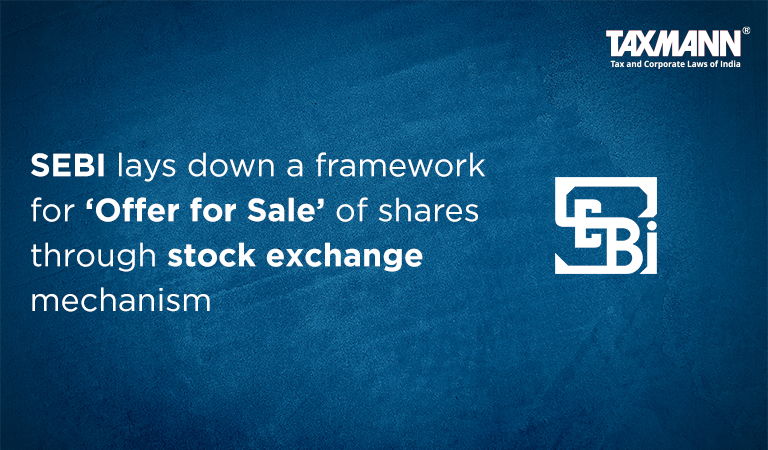SEBI lays down a framework for ‘Offer for Sale’ of shares through stock exchange mechanism
- Blog|News|Company Law|
- 3 Min Read
- By Taxmann
- |
- Last Updated on 12 January, 2023

Circular No. SEBI/HO/MRD/MRD-PoD-3/P/CIR/2023/10, Dated 10.01.2023
Based on the feedback received from various market participants, discussions with Stock Exchanges, Clearing Corporations and deliberations in the Secondary Market Advisory Committee (SMAC), SEBI has decided to modify certain provisions of the existing OFS framework through the Stock Exchange Mechanism.
Accordingly, the SEBI has issued a framework for relaxing the provisions for the ‘Offer for Sale’ of shares through a stock exchange mechanism. The facility of OFS of shares shall be available on the Bombay Stock Exchange (BSE), National Stock Exchange (NSE) and Metropolitan Stock Exchange of India (MSEI). Some of the major highlights are summarised hereunder –
1. Who are eligible sellers to offer shares through an OFS mechanism?
All the promoters, promoter group entities, or non-promoter shareholders of the companies that are eligible for trading and are required to increase public shareholding to meet the minimum public shareholding requirements are eligible sellers to offer shares through the OFS mechanism.
The Sellers may also offer discounts to retail investors. The details of the discount and percentage of reservation for retail investors shall be disclosed upfront in the notice of OFS to the exchange.
2. What is the market Capitalization threshold for companies eligible for an offer for sale?
OFS mechanism shall be available to companies with a market capitalization of Rs 1,000 Cr. and above, with the threshold of market capitalization computed as the average daily market capitalization for six months period prior to the month in which the OFS opens.
3. Who are eligible buyers under the OFS mechanism?
All investors registered with the brokers of the Bombay Stock Exchange (BSE), National Stock Exchange (NSE) and Metropolitan Stock Exchange of India (MSEI), other than the promoter(s) or promoter group entities shall be eligible to buy shares under OFS.
4. What is the cooling off the period for the offer for sale transaction?
The cooling-off period for OFS transactions (i.e. purchase or sale prior to and after the offer) in the shares of the company for the promoter(s) or promoter group entities and non-promoter shareholders shall be based on the liquidity of the shares on exchanges. It can be categorized as:
- For most liquid shares: +2 weeks
- For liquid shares: +4 weeks and
- For illiquid shares: +12 weeks
5. Size of Offer for Sale of shares
The minimum size of the offer shall be Rs 25 Cr. However, promoters or promoter group entities may, make an offer of less than Rs 25 Cr. in order to obtain the minimum public shareholding in a single tranche.
6. Operational Requirements for Offer for Sale of shares
The operational requirements for the offer for the sale of shares are as follows –
(a) Appointment of a broker to undertake transactions on behalf of the eligible buyers;
(b) Announcement by a seller of an intention to the sale of shares latest by 5 pm on T-1 days to the stock exchange. The stock exchange, however, may allow, on a case to case basis based on the request of the seller, the extension of this time up to 6 pm by recording reasons for granting such an extension.
(c) Disclosure of the floor price by seller latest by 5 pm on T-1 day to the stock exchange. Stock exchanges shall ensure that the same is informed to the market immediately.
(d) The duration of the OFS shall be as per the trading hours of the secondary market. Orders shall be placed during trading hours.
7. Withdrawal & Cancellation of Offer For Sale (OFS)
The OFS may be withdrawn only prior to its proposed opening. In such a case, there will be a cooling-off period of 10 trading days from the date of withdrawal before an offer is made once again. The stock exchange shall disseminate details of such withdrawal.
Whereas, cancellation of the offer shall not be permitted during the bidding period. If the seller fails to get sufficient demand from non-retail investors in T day, then the seller may choose to cancel the offer, post bidding, in full (both retail and non-retail) on T day and not proceed with the offer to retail investors on T+1 day. The stock exchange(s) shall suitably disseminate details of such cancellation.
Click Here To Read The Full Circular
Disclaimer: The content/information published on the website is only for general information of the user and shall not be construed as legal advice. While the Taxmann has exercised reasonable efforts to ensure the veracity of information/content published, Taxmann shall be under no liability in any manner whatsoever for incorrect information, if any.

Taxmann Publications has a dedicated in-house Research & Editorial Team. This team consists of a team of Chartered Accountants, Company Secretaries, and Lawyers. This team works under the guidance and supervision of editor-in-chief Mr Rakesh Bhargava.
The Research and Editorial Team is responsible for developing reliable and accurate content for the readers. The team follows the six-sigma approach to achieve the benchmark of zero error in its publications and research platforms. The team ensures that the following publication guidelines are thoroughly followed while developing the content:
- The statutory material is obtained only from the authorized and reliable sources
- All the latest developments in the judicial and legislative fields are covered
- Prepare the analytical write-ups on current, controversial, and important issues to help the readers to understand the concept and its implications
- Every content published by Taxmann is complete, accurate and lucid
- All evidence-based statements are supported with proper reference to Section, Circular No., Notification No. or citations
- The golden rules of grammar, style and consistency are thoroughly followed
- Font and size that’s easy to read and remain consistent across all imprint and digital publications are applied



 CA | CS | CMA
CA | CS | CMA
